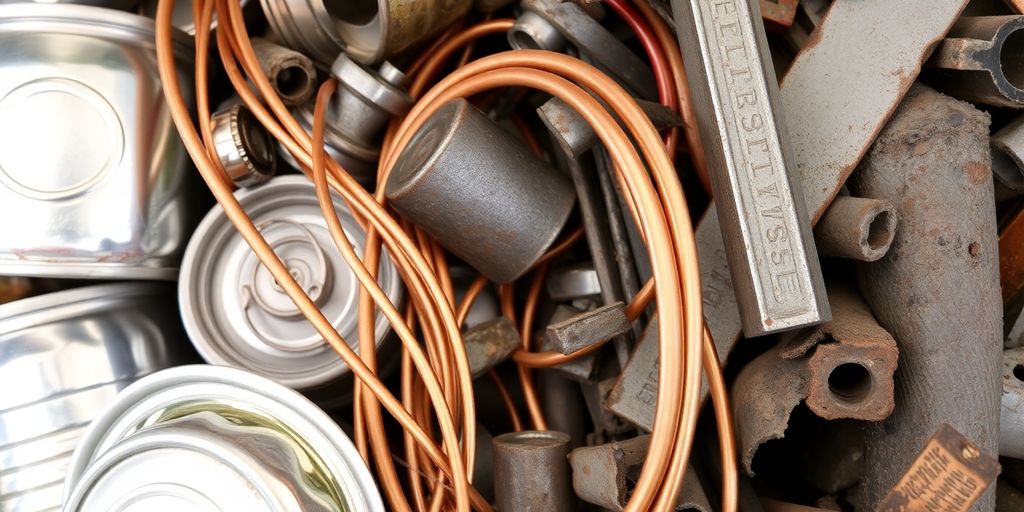Recycling scrap metal is a smart way to help the environment and make some extra cash. Whether you have old appliances, metal scraps from a project, or just random bits lying around, this guide will help you understand where to sell scrap metal and how to do it effectively. From identifying different types of metals to finding local recycling centers, we’ve got you covered!
- Discover the Ultimate Lounge Bar Near Me: A Guide to the Best Local Spots
- Where to Get My Child Tested for Autism Near Me: Finding Local Evaluation Services
- Discover the Best Rooftop Bars Near Me: A Guide to Elevated Experiences
- Discover Exciting Kids Places Near Me for Unforgettable Family Adventures
- Where Can I Buy Kerosene Near Me: A Comprehensive Guide to Local Suppliers
Key Takeaways
- Scrap metal comes in two main types: ferrous (contains iron) and non-ferrous (does not contain iron).
- Using a magnet is an easy way to tell if a metal is ferrous; if it sticks, it’s ferrous.
- You can find scrap metal in many places, including at home, construction sites, and during community events.
- Local scrap yards are great places to sell your metal, and prices can vary based on the type and market demand.
- Recycling scrap metal not only helps you earn money but also benefits the environment by reducing waste.
Understanding Different Types of Scrap Metal
Scrap metal can be divided into two main categories: ferrous and non-ferrous metals. Understanding these types is essential for anyone looking to recycle scrap metal effectively.
You are viewing: Where Can I Sell Scrap Metal Near Me: A Comprehensive Guide to Local Recycling Options
Ferrous Metals
Ferrous metals contain iron and are magnetic. Here are some common examples:
- Steel: Easily identifiable as it sticks to magnets. It’s one of the most common metals found in everyday items.
- Iron: Also magnetic and widely recycled. Common sources include old appliances and construction materials.
Non-Ferrous Metals
Non-ferrous metals do not contain iron and are not magnetic. They are generally more valuable than ferrous metals. Examples include:
- Copper: Known for its excellent conductivity and resistance to corrosion.
- Aluminum: Lightweight and resistant to rust, making it a popular choice in many products.
Common Examples of Scrap Metal
Here’s a quick reference table for common scrap metals and their characteristics:
| Type of Metal | Magnetic | Common Uses | Value Level |
|---|---|---|---|
| Ferrous (Steel) | Yes | Appliances, construction | Low |
| Ferrous (Iron) | Yes | Pipes, automotive parts | Low |
| Non-Ferrous (Copper) | No | Electrical wiring, plumbing | High |
| Non-Ferrous (Aluminum) | No | Cans, foil, automotive parts | Medium |


Understanding the differences between ferrous and non-ferrous metals can help you maximize your recycling efforts and profits.
By knowing what types of metals you have, you can better prepare for recycling and ensure you get the best prices for your scrap.
How to Identify and Sort Scrap Metal
Using a Magnet
A magnet is an essential tool for anyone looking to identify scrap metal. It helps you quickly determine whether a metal is ferrous or non-ferrous:
- Ferrous metals: If the magnet sticks, you have ferrous metals like steel and iron. These are common but usually less valuable.
- Non-ferrous metals: If the magnet doesn’t stick, you’re dealing with non-ferrous metals such as copper and aluminum, which are generally worth more.
Advanced Identification Methods
For those who want to go beyond basic methods, here are some advanced techniques:
- Optical Emissions Spectrometer (OES): This tool analyzes the metal’s composition by observing the light emitted from its atoms.
- X-ray Fluorescence (XRF): This method uses X-rays to determine the elements in a metal sample.
- Laser-Induced Breakdown Spectroscopy (LIBS): A laser pulse analyzes metals quickly and accurately.
Sorting Containers
To maximize your profits, it’s crucial to sort your metals properly. Here are some tips:
- Use separate containers for different types of metals. Mixing them can lead to lower payouts.
- Label each container clearly to avoid confusion.
- Keep a record of what you collect to track your earnings.
Proper sorting can significantly increase the value of your scrap metal. Take the time to do it right!
Where to Find Scrap Metal for Recycling
Read More : Discover the Best Non-Veg Breakfast Near Me: A Culinary Adventure Awaits!
Finding scrap metal for recycling can be easier than you think. Here are some common sources:
Residential Sources
- Home Renovations: Old appliances, pipes, and fixtures can be valuable.
- Garage Cleanouts: Look for unused tools or metal furniture.
- Yard Sales: Sometimes, people sell scrap metal items.
Commercial and Industrial Sources
- Construction Sites: These often have leftover metal materials.
- Manufacturing Facilities: They may have scrap metal from production.
- Warehouses: Old shelving and equipment can be recycled.
Community Collection Events
- Local Clean-Up Days: Many communities organize events to collect scrap metal.
- Recycling Drives: Check for events at schools or community centers.
- Neighborhood Initiatives: Some neighborhoods have regular collection days.
Remember, scrap metal can be found in many places! Always ask for permission before taking anything from private property.
By exploring these sources, you can easily gather scrap metal for recycling and contribute to a more sustainable environment.
Local Scrap Yards and Recycling Centers
Finding a Local Scrap Yard
Finding a local scrap yard can be easy if you know where to look. Here are some tips to help you:
- Search online for scrap yards in your area.
- Ask friends or family if they know any good places.
- Check local classified ads or community boards.
What to Expect at a Recycling Center
When you visit a recycling center, you can expect:
- Friendly staff who can guide you.
- Clear instructions on how to sort your metal.
- Possible weight scales to measure your scrap.
Tips for Getting the Best Prices
To get the best prices for your scrap metal, consider these tips:
- Know the current market prices for different metals.
- Clean your metal to remove any non-metal parts.
- Negotiate with the buyer to get a better deal.
Remember, local recycling centers are not just about getting cash; they also help the environment by reducing waste!
Selling Scrap Metal: Tips and Tricks
Preparing Your Scrap Metal
To get the most out of your scrap metal, make sure to sort and clean it before selling. Here are some steps to follow:
- Separate metals: Use a magnet to distinguish between ferrous and non-ferrous metals. Ferrous metals stick to the magnet, while non-ferrous metals do not.
- Clean your metals: Remove any non-metal parts, like plastic or rubber, to increase the value.
- Use containers: Keep different types of metals in separate containers to avoid mixing them up.
Understanding Market Prices
Knowing the current market prices can help you get a better deal. Here’s a simple table to give you an idea of what different metals might be worth:
| Metal Type | Approximate Price per Pound |
|---|---|
| Aluminum | $0.80 |
| Copper | $3.00 |
| Steel | $0.10 |
| Brass | $2.00 |
Negotiating with Buyers
When you’re ready to sell, don’t be afraid to negotiate. Here are some tips:
- Do your research: Check prices at different scrap yards to know what to expect.
- Be polite but firm: Stand your ground if you believe your metal is worth more.
- Ask for bulk discounts: If you have a lot of scrap, see if you can get a better price for selling in bulk.
Remember, selling scrap metal can be a great way to earn some extra cash while helping the environment. Take the time to prepare and research to maximize your profits!
Environmental and Economic Benefits of Recycling Scrap Metal
Recycling scrap metal has significant environmental and economic advantages. By reusing metals, we can help protect our planet and boost the economy at the same time.
Energy Savings
- Recycling metals uses less energy compared to mining new materials.
- For instance, recycling one ton of steel saves enough energy to power 18 million households for a year.
- Similarly, recycling aluminum cans can save 21,000 kilowatt-hours of electricity.
Economic Impact
- The metal recycling industry generated over $64 billion in the U.S. in 2020.
- It recovered about $40 billion worth of nonferrous metals like aluminum and copper.
- Increasing recycling rates can lead to even greater economic benefits.
Environmental Benefits
- Recycling reduces the need for mining, which can harm the environment.
- It helps conserve natural resources and minimizes pollution.
- Recycling metal conserves natural resources, saves energy, and reduces waste and pollution. It minimizes the environmental impact of mining and processing these materials.
Recycling scrap metal is not just about making money; it’s about making a difference for our planet and future generations.
Additional Services and Options for Scrap Metal Disposal
When it comes to getting rid of scrap metal, there are several helpful options available. Here are some of the most common services you can consider:
Dumpster Rentals
Read More : Discover the Best Non Veg Hotels Near Me for an Unforgettable Dining Experience
Renting a dumpster is a convenient way to dispose of scrap metal. Many waste management companies offer:
- Roll-off dumpsters for large projects
- Single-stream bins for easy sorting on-site
- Flexible rental periods to fit your needs
Donation Options
If your scrap metal is still usable, consider donating it. Some organizations accept metal items, which can help those in need while keeping waste out of landfills. Check with local charities or community groups for their policies on donations.
Professional Pickup Services
For those who prefer not to handle scrap metal themselves, professional pickup services are available. These services often include:
- Heavy lifting and loading of scrap metal
- Transporting it to recycling centers
- Ensuring proper disposal to meet environmental standards
Using these services can make the process of disposing of scrap metal much easier and more efficient.
In summary, whether you choose to rent a dumpster, donate your items, or hire a professional service, there are plenty of options to help you dispose of scrap metal responsibly. Remember to check local regulations and services available in your area, such as Mid Valley Recycle in Yakima County, WA, for more specific guidance.
Final Thoughts on Selling Scrap Metal
In conclusion, selling scrap metal is not just a way to make some extra cash; it’s also a great way to help the environment. By recycling metal, you reduce waste and conserve resources. Remember to check local recycling centers for their specific rules and prices, as they can vary. Whether you choose to sell, donate, or recycle your scrap metal, you’re making a positive impact. So, gather your scrap, find a nearby recycling option, and start turning your old metal into money!
Frequently Asked Questions
What types of scrap metal can I sell?
You can sell both ferrous metals, which contain iron, and non-ferrous metals, which do not. Common examples include steel, aluminum, copper, and brass.
How do I find a local scrap yard?
You can search online for scrap yards in your area or use apps like iScrap to locate nearby recycling centers.
Can I recycle metal from my home?
Yes, many household items like old appliances, cans, and wiring contain metal that can be recycled.
What should I do before selling my scrap metal?
Make sure to sort your metals and clean them if possible. This can help you get a better price.
Are there any fees for scrap metal pickup services?
Yes, there is usually a small fee for pickup services, but it can be convenient if you can’t transport the metal yourself.
How do I know the value of my scrap metal?
The value of scrap metal can change daily based on market prices. Check online resources or contact local scrap yards for current rates.
Soure: https://herego.net
Category: near me


